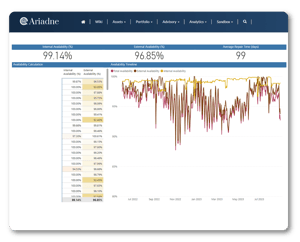
Assess the Contractual Availability of Operators to Facilitate Communication
This case study highlights the successful implementation of an automated solution to collect SCADA production data across a portfolio of 150 PV assets in various geographies, and to record the periods affected by external events not attributable to the operator, in accordance with the operation and maintenance contracts. The solution calculates the contractual availability for each asset, taking into account the contractual obligations and exemptions in the operation and maintenance contract. The implementation of this solution has optimised the availability assessment process, reduced manual effort and improved the relationship between the management team and the operators.
CONTEXT
The client, a leading player in the solar energy industry, managed a portfolio of 150 PV assets spread across different localities and with five operation and maintenance contracts. Accurately assessing contractual availability was essential to ensure compliance with the operation and maintenance contracts.
CHALLENGES
The client faced the following challenges:
- Complex Assessment: Assessing contractual availability required calculating external event periods and applying contractual clauses on each asset.
- Manual Calculations: The monthly availability calculation required manual exclusion of periods affected by external events, which resulted in a laborious and error-prone process.
- Negotiation with Operators: The lack of accurate and automated data made it difficult to negotiate results with operators.
SOLUTION
Quintas Analytics developed and implemented a complete automated solution to address the challenges mentioned above:
- SCADA Data Collection: A system was designed to automatically collect SCADA production and irradiance data from all assets.
- Automatic Registration of External Events: The solution automatically registered periods affected by external events and contractual exclusion periods, according to contractual criteria.
- Contractual Availability Calculation: Algorithms were implemented for calculating the availability of each asset, taking into account the clauses defined in each contract.

RESULTS AND BENEFITS
The implementation of the solution had a positive impact on the operational and contractual management of the
portfolio, as well as on communication with operators:
1. Reduction of Workload: Automation eliminated the need to manually exclude exempt periods and perform complex calculations.
2. Improved Precision: The automated solution reduced the risk of human error in availability calculations.
3. Effective Negotiation: Accurate, automated data strengthened the team's ability to manage negotiations with traders.
4. Contractual Compliance: The solution ensured compliance with contractual clauses and exemptions for each asset.
5. Time Saving: The management team was able to spend more time on strategic tasks rather than manual calculations.
CONCLUSIONS
The solution implemented for the automated assessment of contractual availability in a diversified PV portfolio proved to be successful in improving operational efficiency and the relationship with the operators. Process automation, data collection and automatic calculations provided powerful tools for effective and cost-efficient management. This solution sets a valuable example for the management of similar solar energy projects in various geographies.
